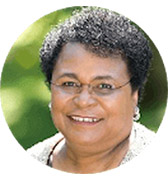Our dedication to Racial Equality and Social Justice (RESJ) spans decades. Learn more about our RESJ Initiative
Jacqueline Bearce, EdD

What program do you teach in?
I teach in the School of Psychology and Counseling’s Mental Health Counseling Program in Springfield, MA. I have been teaching in the program for over 20 years and I currently teach CCP 754 Perspectives in Cross Cultural Counseling and CCP 622 Ethics and Professional Issues for School Counselors and Mental Health Counselors. I am a licensed psychologist and I have worked in community mental health settings, college counseling centers and private practice. I especially enjoy teaching these courses because they speak to where my professional passions lie, that is, in developing cultural competency in counselors/therapists and the vital importance of ethics in providing counseling services. I am also a consultant and group facilitator with a focus on Diversity, Equity and Inclusion (DEI) in organizations and groups.
Who or what has inspired you?
The inspiration for my professional work in counseling and teaching, and in DEI, is rooted in the values and life principles given to me by my parents. My father was a socially active and politically outspoken physician in southern New Jersey. One of our family’s stories is about the night the Ku Klux Klan burnt a cross on our lawn. In the oral tradition, my father would repeat this and other stories of his and my mother’s overcoming racism and threats in this small town. I learned about racism and segregation at an early age and my parents warned us about and protected us from physical and psychological dangers. I also learned at an early age about the impact of PTSD on the person and on the family.
Education was also very important in my family. The love of reading was shared by all of us and books were valued. Saturday mornings were spent at the library. Completing homework assignments on a daily basis was required. Higher education was expected. My graduate degrees were rewarded. My parents’ expectations that I achieve academically clearly did not match the world’s assumption that I would not. I am not only inspired by my family; I am grateful for them.
What does racial equality and social justice mean to you?
The meaning of racial equality is articulated in the Declaration of Independence; …all men (people) are created equal and are endowed by their Creator with certain unalienable Rights… Unfortunately, it seems that deep within the consciousness of the US is the belief that some people are more human and, therefore, more valuable than other people. This over and under valuing is based on skin color, an indicator of race, in the US and in most other parts of the world. As a consequence, some people have historically been, and continue to be, denied their inalienable Rights.
Social Justice seeks to correct this custom of denied rights and seeks to ensure that all people are treated with equity and justice by all social systems – such as, education, finance, legal, access to health care, military – and the rules that govern these systems.
What is your favorite book, poetry, documentary or other resource on Black history?
I have enjoyed reading literature on Black history and I particularly enjoy histories that tell the truth and include people historically omitted from history books. One such book: A Different Mirror: A History of Multicultural America by Ronald Takaki is one of my favorites because it presents US history from the perspectives of all of the people who were there. And, it tells the truth.
I have currently begun to read President Obama’s recent book, A Promised Land.
When I dream in Black…
I do understand my legacy and where I come from and I am even more committed to “passing it on” – making my contribution to the education of future counselors and therapists. It is my intention that my students gain from what I have to offer them and be better equipped to be culturally competent and ethical counselors/therapists.


